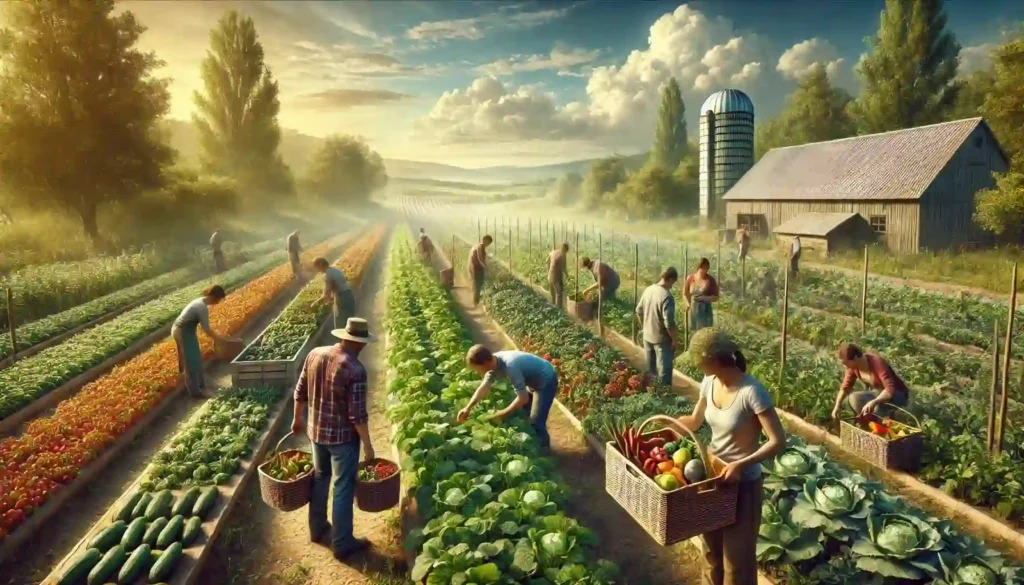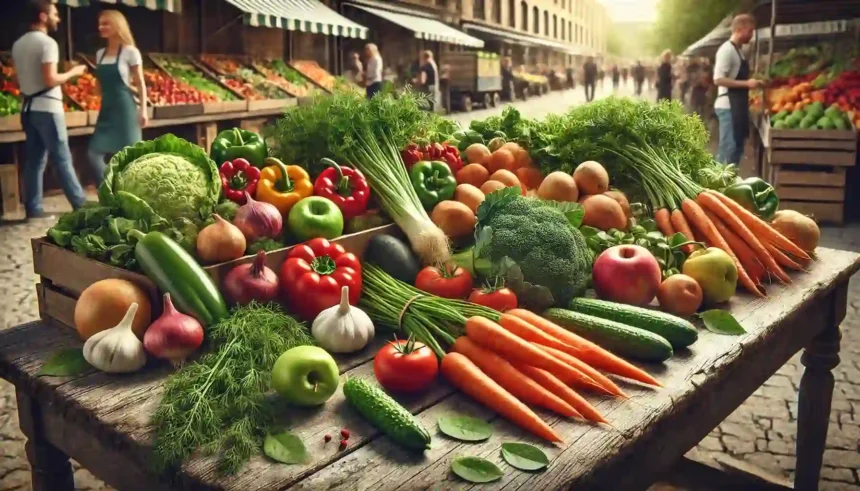Ethical eating involves making food choices that are not only healthy but also socially and environmentally responsible. By supporting fair trade and local farmers, consumers can contribute to sustainable agriculture, fair labor practices, and the well-being of local communities. Ethical eating emphasizes the importance of understanding where food comes from and the impact of food choices on people and the planet.
“Ethical eating is about making choices that are good for our bodies, our communities, and our planet.” – Alice Waters, chef and food activist.
Alice Waters highlights the holistic approach to making food choices that benefit health, communities, and the environment.
What is Ethical Eating?
Ethical eating is the practice of choosing foods that align with ethical standards, including fair trade, environmental sustainability, and animal welfare. It involves considering the impact of food production on workers, the environment, and local economies. Ethical eating encourages transparency in food sourcing and promotes practices that ensure fair treatment and sustainability.
Key Principles of Ethical Eating
- Fair Trade: Supporting products that ensure fair wages and safe working conditions for farmers and workers.
- Local Sourcing: Buying food from local farmers to support local economies and reduce environmental impact.
- Sustainability: Choosing foods produced through sustainable farming practices that protect the environment.
- Animal Welfare: Selecting products that adhere to humane treatment of animals.
“Ethical eating empowers consumers to make choices that reflect their values and support a just food system.” – Michael Pollan, author and food activist.
Michael Pollan underscores the power of consumers to drive change through ethical eating choices.

Benefits of Supporting Fair Trade and Local Farmers
Supporting fair trade and local farmers offers numerous benefits for individuals, communities, and the environment. Ethical eating can lead to healthier diets, stronger local economies, and a more sustainable food system.
Health Benefits
Ethical eating often involves consuming fresher, less processed foods, which can improve health.
- Nutrient-Rich Foods: Local and fair trade foods are often fresher and more nutrient-dense.
- Reduced Chemicals: Ethical farming practices typically involve fewer pesticides and chemicals.
- Diverse Diet: Supporting local farmers encourages eating a variety of seasonal foods.
Economic Benefits
Buying from local farmers and fair trade organizations supports local economies and fair labor practices.
- Local Economy: Spending money on local food helps keep funds within the community.
- Fair Wages: Fair trade ensures that farmers and workers receive fair compensation.
- Job Creation: Supporting local agriculture can create jobs and strengthen community resilience.
Environmental Benefits
Ethical eating promotes sustainable practices that reduce the environmental impact of food production.
- Lower Carbon Footprint: Local foods travel shorter distances, reducing transportation emissions.
- Biodiversity: Sustainable farming practices protect biodiversity and soil health.
- Waste Reduction: Buying local often involves less packaging and waste.
“Supporting local farmers and fair trade products is a powerful way to promote sustainability and social justice.” – Vandana Shiva, environmental activist and author.
Vandana Shiva emphasizes the positive impact of ethical eating on sustainability and social justice.

How to Support Fair Trade and Local Farmers
Consumers can make a significant impact by choosing to support fair trade and local farmers. Here are some practical tips for incorporating ethical eating into your lifestyle.
Buy Local Produce
Support local farmers by purchasing produce from farmers’ markets, farm stands, and community-supported agriculture (CSA) programs.
- Farmers’ Markets: Visit farmers’ markets to buy fresh, seasonal produce directly from farmers.
- CSA Programs: Join a CSA to receive regular boxes of fresh, local produce.
- Local Grocers: Shop at local grocery stores that prioritize local produce.
Choose Fair Trade Products
Look for fair trade certifications when purchasing products such as coffee, chocolate, tea, and bananas.
- Fair Trade Certification: Look for labels from organizations like Fair Trade USA and Fairtrade International.
- Ethical Brands: Support brands that are committed to fair trade practices.
- Educate Yourself: Learn about the origins of the products you buy and the conditions under which they are produced.
Grow Your Own Food
Consider growing your own fruits, vegetables, and herbs to ensure fresh, ethical produce.
- Home Garden: Start a home garden to grow your own organic produce.
- Community Gardens: Participate in community gardens to grow and share food locally.
- Urban Farming: Explore urban farming options if you live in a city or have limited space.
Reduce Food Waste
Minimize food waste by planning meals, storing food properly, and using leftovers creatively.
- Meal Planning: Plan meals to use ingredients efficiently and avoid over-purchasing.
- Proper Storage: Store food correctly to extend its shelf life and reduce spoilage.
- Creative Cooking: Use leftovers in new recipes to minimize waste.
“Small actions like buying local produce and choosing fair trade products can collectively make a big difference.” – Alice Walker, author and activist.
Alice Walker highlights the significant impact of collective small actions in promoting ethical eating.
Popular Fair Trade and Local Food Brands
Many brands and organizations are committed to fair trade and supporting local farmers. Here are some well-known ethical eating brands that prioritize fair trade and local sourcing.
Equal Exchange
Equal Exchange offers a wide range of fair trade products, including coffee, tea, chocolate, and bananas.
- Fair Trade Commitment: Ensures fair wages and safe working conditions for farmers.
- Product Range: Coffee, tea, chocolate, bananas, and other food products.
- Sustainable Practices: Focuses on environmentally sustainable farming practices.
Thrive Market
Thrive Market provides access to organic and sustainable products, including many fair trade options.
- Membership Model: Offers discounts on high-quality, ethical products through a membership model.
- Fair Trade Products: Wide selection of fair trade and sustainably sourced foods.
- Support for Local Farmers: Partners with local farms and producers.
Community Supported Agriculture (CSA)
CSA programs connect consumers directly with local farmers, offering fresh, seasonal produce.
- Local Produce: Regular deliveries of fresh, locally grown produce.
- Direct Support: Provides financial support to local farmers through subscriptions.
- Seasonal Eating: Encourages consumption of seasonal, local foods.
Divine Chocolate
Divine Chocolate is a fair trade chocolate company co-owned by cocoa farmers.
- Fair Trade Certification: Ensures fair wages and ethical labor practices.
- Farmer Ownership: Farmers own shares in the company, empowering them economically.
- Quality Products: High-quality chocolate made from sustainably sourced cocoa.
“Brands like Equal Exchange and Thrive Market are leading the way in promoting ethical eating practices.” – Dr. Jane Goodall, primatologist and environmental activist.
Dr. Jane Goodall praises the efforts of leading brands in promoting fair trade and sustainability.

The Future of Ethical Eating
The future of ethical eating looks promising as more consumers become aware of the impact of their food choices. Ethical eating is expected to grow, driven by increasing demand for transparency, sustainability, and social responsibility in the food industry.
Increasing Consumer Awareness
Growing awareness of environmental and social issues is driving demand for ethical food products.
- Informed Consumers: Consumers are seeking more information about the origins of their food.
- Educational Campaigns: Increased efforts to educate consumers about the benefits of ethical eating.
- Media Influence: Media coverage and documentaries are raising awareness about food production issues.
Technological Advancements
Technology is playing a crucial role in promoting ethical eating and transparency in the food supply chain.
- Blockchain Technology: Blockchain is being used to trace the origins and journey of food products.
- Apps and Platforms: Mobile apps and online platforms are making it easier to find and support ethical food brands.
- Sustainable Farming Techniques: Advances in sustainable farming practices are improving food production efficiency.
Policy and Regulation
Government policies and regulations are increasingly supporting ethical eating practices.
- Food Labeling Laws: Stricter food labeling laws to provide transparency about food origins and production practices.
- Support for Local Farmers: Government initiatives to support local agriculture and fair trade.
- Sustainability Standards: Implementation of sustainability standards for food production and distribution.
“The future of food lies in our ability to make ethical and sustainable choices every day.” – Carlo Petrini, founder of the Slow Food Movement.
Carlo Petrini envisions a future where ethical and sustainable food choices become the norm.
Understanding Sustainable Food offers insights into the importance of sustainable eating. For more tips on ethical eating, visit Ethical Eating Tips. Discover additional strategies for supporting local farmers in our support local farmers section. Learn more about fair trade products with our guide to fair trade. For more information on ethical eating, visit Fair Trade USA. To explore local food options, check out LocalHarvest. For additional resources, see Sustainable Food Trust.















